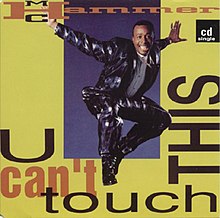
"Uninvited" is a song by Canadian recording artist and songwriter Alanis Morissette, released as a single from the soundtrack of City of Angels in February 1998, becoming Morissette's first new recording since her international debut album, Jagged Little Pill (1995). Morissette wrote the song and co-produced it with Rob Cavallo. "Uninvited" is driven by four piano notes and builds to an instrumental climax, and haunting atmosphere accompanied by cryptic lyrics.
"Super Freak" is a 1981 single produced and performed by American singer Rick James. The song, co-written by James and Alonzo Miller, was first released on James' fifth album, Street Songs (1981) and became one of James' signature songs. "Freak" is a slang term for the sexually adventurous, as described in the song's lyrics, "She's a very kinky girl / The kind you don't take home to mother". Rolling Stone magazine ranked the song number 477 in its list of the 500 Greatest Songs of All Time in 2004, number 481 in 2010, and number 153 in an updated list in 2021. The song was nominated for the Grammy for Best Male Rock Vocal Performance at the 1982 Grammys. The song has been sampled by MC Hammer in 1990, and by Nicki Minaj in 2022.

"Gangsta's Paradise" is a single by American rapper Coolio, released on August 1, 1995 by Tommy Boy, Warner Bros. and MCA. Interpolating Stevie Wonder's song "Pastime Paradise" (1976), "Gangsta's Paradise" features vocals from American singer L.V. who served as a co-composer and co-lyricist with Coolio and Doug Rasheed, with Wonder also being credited for the composition and lyrics. Certified Platinum in October, the song was included on Coolio's second album, Gangsta's Paradise, in November 1995. Its music video was directed by Antoine Fuqua and featured Michelle Pfeiffer. The song is taken from Pfeiffer's movie, Dangerous Minds. The music video is also themed around the movie.

Please Hammer Don't Hurt 'Em is the third studio album by American rapper MC Hammer, released on February 12, 1990 by Capitol Records and EMI Records. Produced, recorded and mixed by Felton Pilate and James Earley. With a small budget of around $10,000 and recorded on a modified tour bus between May 1988 to November 1989, The album incorporates Hip Hop, pop rap and dance.

"Alright" is a song by American singer-songwriter Janet Jackson from her fourth studio album, Janet Jackson's Rhythm Nation 1814 (1989). Written by Jackson and Jimmy Jam & Terry Lewis, the song was released on March 4, 1990, by A&M Records as the fourth single from Janet Jackson's Rhythm Nation 1814. In the United Kingdom, it was issued as the album's fifth single in June 1990.
"Killing Me Softly with His Song" is a song composed by Charles Fox with lyrics by Norman Gimbel. The lyrics were written in collaboration with Lori Lieberman after she was inspired by a Don McLean performance in late 1971. Denied writing credit by Fox and Gimbel, Lieberman released her version of the song in 1972, but it did not chart. The song has been covered by many other artists.

"California Love" is a song by American rapper 2Pac featuring fellow American rapper-producer Dr. Dre and American singer Roger Troutman of the funk group Zapp. The song was released as 2Pac's comeback single after his release from prison in 1995 and was his first single as the newest artist of Death Row Records. The original version is featured on the UK version of his fourth album, All Eyez on Me (1996), and is one of 2Pac's most widely known and most successful singles. It reached number one on the Billboard Hot 100 for two weeks and also topped the charts of Italy, New Zealand, and Sweden. The song was posthumously nominated for the Grammy Award for Best Rap Performance by a Duo or Group in 1997.

"Opposites Attract" is a song by American singer Paula Abdul from her debut album, Forever Your Girl (1988). It was written and produced by Oliver Leiber. Vocals on the song, in addition to Abdul, were provided by Bruce DeShazer and Marv Gunn, also known as the Wild Pair. "Opposites Attract" was the sixth and final single from the album in November 1989 and achieved success in many countries, including the United States, Canada, and Australia, where it was a number-one hit. Lyrically, the song is about a couple who love each other despite being different in almost every way possible.

"Top of the World" is a song by American singer Brandy Norwood, from her second studio album, Never Say Never (1998). The song was written by Rodney "Darkchild" Jerkins, Fred Jerkins III, LaShawn Daniels, Isaac Phillips, Nycolia "Tye-V" Turman, and Mason Betha, with Darkchild and Norwood producing and Mase having featured vocals. Released as the album's second international single in 1998, the track peaked at number two on the UK Singles Chart and reached the top 20 in Iceland, Ireland, and New Zealand.

"Sledgehammer" is a song by the English rock musician Peter Gabriel. It was released in April 1986 as the lead single from his fifth studio album, So (1986). It was produced by Gabriel and Daniel Lanois. It reached No. 1 in Canada on 21 July 1986, where it spent four weeks; No. 1 on the Billboard Hot 100 chart in the United States on 26 July 1986; and No. 4 on the UK Singles Chart, thanks in part to its music video. It was his biggest hit in North America and ties with "Games Without Frontiers" as his biggest hit in the United Kingdom.
"The End of the Innocence" is the lead single and title track from Don Henley's third solo studio album of the same name, released in 1989. Henley co-wrote and co-produced the song with Bruce Hornsby, who also performed piano. Both artists regularly include the song in their live performances. The single peaked at number eight on the US Billboard Hot 100, becoming his fifth solo top-10 hit on the chart. "The End of the Innocence" also became his fourth number-one single on the Album Rock Tracks chart. In Canada, it reached number three on the RPM Top Singles and Adult Contemporary charts. The song received Grammy nominations for Record of the Year and Song of the Year.

"Land of Confusion" is a song by the English rock band Genesis from their 1986 album Invisible Touch. The music was written by the band, while the lyrics were written by guitarist Mike Rutherford. The song was the third track on the album and was the third track released as a single, reaching No. 14 in the UK in December 1986 and No. 4 in the U.S. in January 1987. It also reached the top 10 in several other countries including Canada, Ireland, West Germany and the Netherlands. The song's video featured puppets from the 1980s UK sketch show Spitting Image.

"Bye Bye Bye" is a song by American boy band NSYNC from their third studio album, No Strings Attached. It was released on January 17, 2000, as the lead single from the album. The song was written and produced by Kristian Lundin and Jake Schulze, with additional writing by Andreas Carlsson. Its lyrics describe the end of a romantic relationship; it was reported to also reference the group's separation from their manager Lou Pearlman and their record label RCA Records.
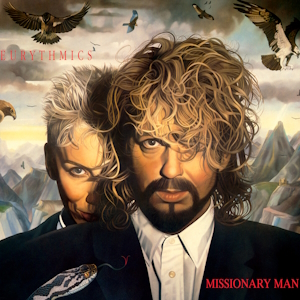
"Missionary Man" is a song by British pop duo Eurythmics from their fifth studio album, Revenge (1986). The song features Jimmy Zavala on harmonica and Joniece Jamison on backing vocals.

"Intergalactic" is a song by American hip hop group Beastie Boys. "Intergalactic" was released as the first single from their fifth studio album, Hello Nasty, on June 2, 1998. The single reached number 28 on the US Billboard Hot 100, making it the band's third top-40 single, and reached number five on the UK Singles Chart, where it remains the band's biggest hit. It received a Grammy Award for Best Rap Performance by a Duo or Group in 1999.

This is the discography of Canadian musician, singer, songwriter and pianist, Sarah McLachlan. Her debut album, Touch was released in 1988 and included first singles: "Vox", "Steaming" and "Ben's Song". The album charted in Canada and the United States and was certified platinum in Canada and gold in the US. The next album, Solace was issued in 1991. It peaked at number 20 in Canada and was certified double platinum there. Solace also charted in the US, where it was certified gold. It featured three singles: "The Path of Thorns (Terms)", "Into the Fire" and "Drawn to the Rhythm". The third studio album, Fumbling Towards Ecstasy (1993) became McLachlan's mainstream breakthrough album in Canada and the United States. It peaked at number five in Canada and number 50 on the US Billboard 200, and was certified 5× platinum in Canada and 3× platinum in the US. "Possession" and "Good Enough" became McLachlan's first singles to chart on the US Billboard Hot 100. "Good Enough" also became her first top 10 hit in Canada, reaching number nine. At the 37th Annual Grammy Awards, Fumbling Towards Ecstasy was nominated for the Grammy Award for Best Alternative Music Performance.

The discography of MC Hammer, or simply Hammer, an American rapper, includes hit records "U Can't Touch This", "Pray" and "2 Legit 2 Quit". Hammer is known for his flashy dance movements, choreography and Hammer pants. His superstar-status and entertaining showmanship made him a household name and hip hop icon. Hammer has sold more than 50 million records worldwide, breaking down numerous doors for rap music and demonstrating that hip-hop had the potential for blockbuster success. A multi-award winner, M.C. Hammer is considered a "forefather/pioneer" and innovator of pop rap, and is the first hip hop artist to achieve diamond status for an album.

"Human Touch" is a song recorded by the American rock singer Bruce Springsteen. It was the first single from his 1992 album of the same name and was released on March 9, 1992. The song features future American Idol judge Randy Jackson on bass guitar and Toto's Jeff Porcaro on drums.

"Pray" is a song released in August 1990 by Capitol as the third single from American rapper and dancer MC Hammer's third album, Please Hammer Don't Hurt 'Em (1990). Produced by Hammer, the song heavily samples Prince's 1984 song "When Doves Cry", the first of just a few times that Prince allowed samples of his compositions. The track also interpolates Faith No More's "We Care a Lot". The word "pray" is mentioned 147 times during the song, setting the record for the number of times a song title is repeated in an American Top 40 hit.

"Here Comes the Hammer" is a song written and performed by American rapper MC Hammer, first released on his third album, Please Hammer Don't Hurt 'Em (1990). It was also released as a single, which reached number 54 on the US Billboard Hot 100. The song also reached the Top 20 on the Billboard Hot R&B/Hip-Hop Songs and Hot Rap Songs charts. It was also nominated for a Grammy Award. At the time of its release, the music video accompanying the release of the single was one of the most expensive ever.
